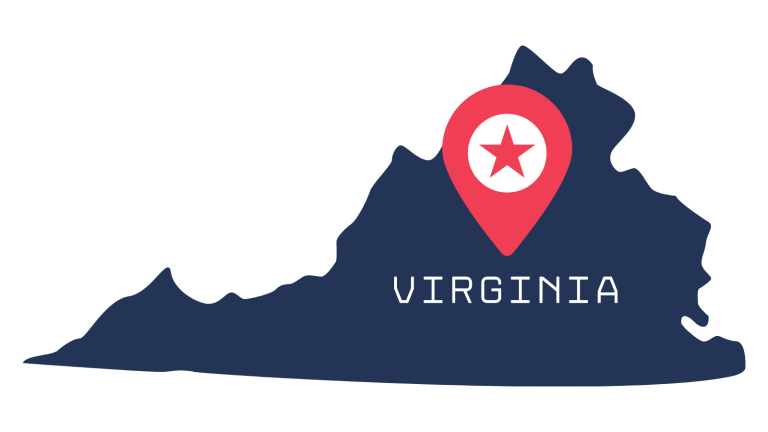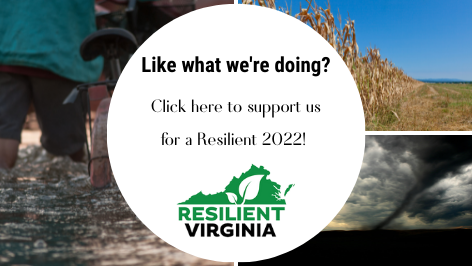By: Tracy Garland, Program and Development Director, Resilient Virginia 1/28/2022

Introduction
Virginia has made great strides over the last few years toward becoming a more resilient place to live, work and raise a family. In 2020 and 2021, significant state-level progress was made in the areas of coastal resiliency, flood preparedness, and building and infrastructure design.
In the upcoming General Assembly that began on January 12th, some of these initiatives are under threat. In the coming weeks, lawmakers will begin considering and voting on a variety of bills that could either move forward or set back progress toward resiliency. Below we outline what happened over the last couple of years and what to keep an eye on this year.
Significant policies in 2020 and 2021
Clean Economy Act
The Virginia Clean Economy Act, signed into law by Governor Ralph Northam in April of 2020, created the state’s first Clean Energy Standard and positioned the Commonwealth as the first Southern state with a goal of going carbon-free by 2050. The bill mandates that the state’s biggest utility, Dominion Energy, switch to renewable energy by 2045; and Appalachian Power, which serves far southwest Virginia, must go carbon-free by 2050. It also mandates the shutdown of nearly all of the state’s coal plants by the end of 2024. In addition, the legislation sets energy efficiency standards that the utilities must meet, allows for more rooftop solar and expands net metering, mandates that utilities acquire storage capacity, and calls for the development of offshore and onshore wind energy.
Clean Energy and Community Flood Preparedness Act
The Virginia Clean Energy and Community Flood Preparedness Act enabled Virginia to join the Regional Greenhouse Gas Initiative (RGGI), a carbon cap-and-trade market. The sale of emissions allowances supply funds for the Community Flood Preparedness Fund, and are used to enhance flood prevention, protection, and coastal resilience, as well as energy efficiency and weatherization projects for low income citizens. It created a low-interest loan program to help inland and coastal communities that are subject to recurrent flooding.
In its first year, the fund netted $228 million, half of which is funding low-income energy efficiency programs and 45% is funding the CFPF, in addition to making tens of millions of dollars in loans available to local governments and tribes for capacity building, planning and implementing flood resilience projects. See “The Road Ahead” section below for an update on the status of RGGI in Virginia.
Transportation
In 2021, Virginia passed a package of bills to support electrification of its transportation sector. The Clean Car Standards (HB1965) bill will require car manufacturers to increase EV inventory; HJ542 will provide for a study on transit equity; and HB2282 requires delivery of a set of recommendations to speed up state-wide adoption of EVs by May 2022. An EV rebate policy (HB1979) and a grant for electrifying school buses (HB2118) passed but remain unfunded.
Coastal Resilience Master Plan
In order to develop mitigation strategies to reduce impacts of natural hazards and extreme weather, Governor Ralph Northam led the development of a Virginia Coastal Resiliency Master Planning Framework to inform development of a Virginia Coastal Resilience Master Plan. To support plan development, the administration created the Virginia Coastal Zone Management Program, the Virginia Coastal Resilience Technical Advisory Committee and appointed a Chief Resilience officer. Phase 1 of the Virginia Coastal Resilience Master Plan was released in December of 2021.
Chesapeake Bay Preservation Act
During the 2020 session of the Virginia General Assembly, the Chesapeake Bay Preservation Act (CBPA) was modified to include “coastal resilience and adaptation to sea-level rise and climate change” and in 2021 the Virginia Department of Environmental Quality issued draft regulations to support that modification.
VDH Septic Regulations
Legislation passed during the 2021 General Assembly requires that the Virginia Department of Health update its regulations concerning the siting and construction of septic systems to include climate change considerations. The agency is expected to Implement these changes over the course of 2022.
VDOT Engineering Standards
In 2020, the Virginia Department of Transportation issued new design standards to make transportation structures and bridges more adaptable to climate change impacts.
Environmental Justice Act
The Commonwealth has made significant strides toward addressing the environmental and climate impacts on low-income and minority communities. In 2019, through Executive Order 29, Governor Northam established the Virginia Council on Environmental Justice. In 2020, the Environmental Justice Act established the policy that the Commonwealth will promote environmental justice and ensure it is carried out throughout the state agencies. An Interagency Environmental Justice Working Group was established, and its goal was to develop agency-specific environmental justice policies. The report from the Working Group was published in 2020 and work continued through 2021.
The Road Ahead: Resiliency in Virginia 2022
The 2022 Virginia General Assembly is in full swing, so we’ve summarized updates on a few key bills we consider significant to move climate adaptation and resiliency forward in the state. Note that this article is a “snapshot in time.” We have provided links to advocacy groups that are reporting on day-to-day progress of these bills.
Regional Greenhouse Gas Initiative
Perhaps the most significant policy on the chopping block this year is the RGGI, mentioned previously. Governor Glen Younkin, has pledged to remove Virginia from the program using a multi-pronged strategy. Recently, Younkin signed an Executive Order 9 to withdraw VA from RGGI, calling on the state’s State Air Pollution Control Board to create an “emergency regulation” to begin a process of ending the state’s participation in the program. It is unclear if this action will prevail because, according to former Virginia Attorney General Mark Herring’s legal opinion, “the Governor may not repeal or eliminate, through an executive order or other action, the enacted statutes and regulations pertaining to the Commonwealth’s participation in the Regional Greenhouse Gas Initiative…” In addition, Cale Jaffe, Director of UVA’s Environmental Law and Community Engagement Clinic says that if the pollution control board repeals the code, it will create administrative issues but will not repeal the underlying statute upon which the program was created. For now, RGGI is operational while these legal, administrative and funding issues are being debated.
Meanwhile the third round of funding supported by RGGI funds for the Community Flood Preparedness Grant Fund is open for proposals until April 8, 2022.
Environmental Justice
In 2022, a key bill currently in committee titled “Comprehensive Plan; Adoption of an Environmental Justice Strategy” (HB 969), requires larger municipalities to consider incorporating environmental justice objectives and policies in all future comprehensive plan reviews.
Another bill (HB1276) titled “Comprehensive plan; healthy communities strategy” authorizes cities with populations greater than 20,000 and counties with populations greater than 100,000 to consider, at the next and all subsequent reviews of the comprehensive plan, adopting a healthy communities strategy.
A third bill (HB141/SB158), would establish a grant fund to support costs of acquiring, preserving, and interpreting sites of importance to groups representing indigenous, blacks, and people of color.
Environmental justice advocates are tracking several other related bills through the assembly this year. For more information, visit the Virginia Interfaith Center General Assembly 2022 Legislative Priorities and the Virginia Interfaith Power and Light General Assembly 2022 page.
Economy and Clean Energy
The New Virginia Economy Act (HB 469) would commit Virginia to a Climate Action Plan, establish a fossil fuel moratorium, transition Virginia to a clean economy, and protect workers & communities from disproportionate burdens of polluting facilities. At this time, the bill has been referred to the House Commerce and Energy Committee.
Solar-ready roofs are addressed in SB 290/HB471 which would require state agencies or localities that are designing a building over 5,000 sq. ft. or having a substantial renovation done to install solar-ready roofs. For schools the requirement would be to design to net-zero energy standards.
Transportation
HB 707 titled “Transportation funding; statewide prioritization process, resiliency” would add resiliency to the list of factors to be considered during the statewide transportation funding prioritization process. The bill would also require that factors such as congestion mitigation, economic development, accessibility, safety, resiliency, and environmental quality be considered relative to the anticipated life-cycle cost of the project or strategy under consideration.
HB 708 titled “Virginia Electric Vehicle Grant Program; use of state funds” would allow the Department of Environmental Quality to fund a work group to develop recommendations and establish criteria for the Virginia Electric Vehicle Grant Program.
HB351 titled “Driving Decarbonization Program and Fund” would help accelerate the installation of EV charging stations by establishing a grant program to help private developers, with funds set aside for historically disadvantaged communities.
Resiliency Planning and Programs
Resiliency in comprehensive plans is supported by HB520, which encourages localities to adopt resilience strategies when updating their plans, and to include strategies to anticipate, prepare for, respond to, and adapt to changing conditions and hazardous events.
The Chesapeake Bay Commission has proposed a suite of bills intended to integrate statewide flooding and resilience planning and implementation across the Commonwealth. HB516/SB551 establishes the Virginia Department of Conservation and Recreation as the responsible agency for integrating and implementing the Virginia Flood Protection Master Plan and the Virginia Coastal Resilience Master Plan; establishes the VA Coastal Resilience Technical Advisory Committee, and requires DCR to prepare a Community Outreach and Engagement Plan. HB517 clarifies the duties of the Virginia Chief Resilience Officer, and requires a report to the Governor every two years on climate risks and flood protection planning and measures. The bill HB 1309 establishes a $25 million revolving loan fund for government and private property owners to use to mitigate flood events.
Rural Economy
Two bills have been introduced that would support local farmers and agricultural businesses across the state. HB323 would expand the grants that can be made to support local food production and sustainable agriculture from $25,000 to $50,000. The original bill, passed in 2021, provided grants to political subdivisions to support infrastructure development projects supporting local farmers and businesses that manage, aggregate and market local food products.HB 830 directs Virginia Department of Agriculture and Consumer Services to assess meat processing businesses’ existing capacity and gaps and undertake financial incentive programs to enhance capacity.
Conclusion
Given the enormous strides toward resiliency made in the past few years, there is reason for optimism; however a great deal of work remains to be done. A number of bills introduced this year are challenging the RGGI program and throwing roadblocks in front of other clean energy and resiliency programs that have been established over the past two years. Legislation passed by the 2022 General Assembly will play a crucial role in how resilient Virginia actually is in the coming years as we face ever changing weather patterns, increased flooding and heat, and other impacts of a changing climate.
Resources
For more information on legislative and policy initiatives happening in the Commonwealth, here are some resources to explore:
Appalachian Voices Virginia General Assembly 2022
League of Conservation Voters: 2022 General Assembly Bill Tracking
Virginia Conservation Network Bill Tracker
Wetlands Watch: 2021: A Year of Amazing Progress Toward a Resilient Virginia





